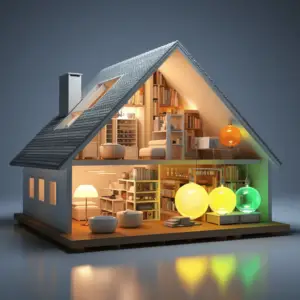Making a home energy-efficient is essential for sustainable living and cost savings. To do this, it’s important to make effective changes. Simple yet powerful shifts can help homeowners reduce their energy use and support a greener future.
Understanding the areas of improvement is key. So, the first step is to do an energy audit. This will tell you which parts need work, like insulation, appliances, and lighting systems.
Insulating walls, windows, and attics can help maintain interior temperatures while using less heating or cooling. Triple-pane glass windows are great for thermal insulation.
Investing in energy-efficient appliances is a long-term benefit. Look for Energy Star certified models. You can also save energy by turning off appliances when not in use and using power strips.
LED lights use 75% less energy than traditional incandescent bulbs. Use daylight by placing windows strategically.
Pro Tip: Programmable thermostats let you adjust temperature settings. This device optimizes heating and cooling based on occupancy patterns.
Table of Contents
Assessing current energy usage
Assessing the energy usage of your home is crucial for improving its efficiency. Knowing how much energy you consume helps you recognize areas of improvement. Let’s look at some key factors to consider for assessing energy usage!
| Factor | Description |
|---|---|
| Lighting | Evaluate light type & usage |
| Appliances | Assess appliance efficiency |
| Insulation | Check walls & attics for insulation |
| Windows | Examine window quality & insulation |
| HVAC System | Analyze HVAC system effectiveness |
These factors are important as they affect energy consumption. Evaluating lighting helps switch to energy-efficient LED bulbs. Assessing appliance efficiency lets you replace old models with Energy Star certified ones, saving energy and costs.
Insulation in walls & attics helps maintain a consistent indoor temperature, reducing HVAC system usage. Upgrading windows with better insulation prevents heat transfer, so you don’t need to adjust the temperature. Regular maintenance & optimization of your HVAC system ensures effectiveness while minimizing energy waste.
To improve energy efficiency, install programmable thermostats to regulate temperatures based on occupancy. Smart power strips cut power to idle electronics, reducing vampire power consumption.
Insulation and weatherization

Insulate walls to save energy. Stop heat loss in winter and keep home cooler in summer. Seal air leaks to prevent conditioned air escaping and outside air infiltrating. Upgrade windows with double/triple-pane glass, low-emissivity coatings and insulated frames. Insulate your attic to keep heat from going out the roof. Inspect ductwork for cracks or disconnections.
Make your home an energy-efficient oasis! An expert or online resources can help you save energy. Make a positive impact on the environment and your wallet! Start today!
Upgrading appliances and lighting
Replace traditional incandescent bulbs with energy-efficient LED or CFL lights. These consume fewer electricity and last way longer! Invest in ENERGY STAR certified appliances, they meet strict efficiency guidelines. Look for labels indicating high energy efficiency ratings.
Smart home technology is a great idea! You can control and monitor your appliances and lighting remotely, which means they are only used when necessary. Programmable thermostats can help regulate heating and cooling based on your schedule, saving energy.
Be sure to unplug devices when not in use, or use power strips. And maintain appliances regularly, like cleaning filters and coils, to ensure they work efficiently without consuming excess energy.
It’s important to think beyond just upgrading appliances and lighting to improve energy efficiency. Look at other factors such as insulation, sealing air leaks, and proper ventilation.
The U.S. Department of Energy conducted a study which found that replacing traditional bulbs with LEDs can result in significant energy savings.
Heating and cooling systems
Upgrade to energy-efficient models with high Energy Star ratings.
Seal windows and doors with weatherstripping or caulking to prevent air leakage.
Install a programmable thermostat to optimize temperature settings.
Schedule professional inspections and maintenance for HVAC systems.
Improve insulation in walls, attics, and basements.
Also, ensure vents are not blocked by furniture or draperies, so there’s proper airflow.
Here’s a little historical fun fact: In ancient Rome, the wealthy had access to an ingenious system called “hypocaust” which heated their villa floors using hot air from below ground level furnaces!
These measures will help maximize energy efficiency, saving money and reducing your carbon footprint. Even small steps make a big difference!
Renewable energy options
Check out these renewable energy options and their benefits:
| Option | Benefits |
|---|---|
| Solar Power | Clean electricity from the sun |
| Wind Power | Harnessing wind to generate electricity |
| Geothermal Energy | Heat from the Earth’s core |
Plus, there are other ways to make your home more energy efficient. Hydropower systems by using water flow or biomass energy technologies can reduce your reliance on regular power sources.
Pro Tip: Consider your location, budget, and available resources when choosing a renewable energy option for your home. Make an informed decision!
Water conservation
Precious water is important to both our wallets and the environment. Here are some simple ways to save:
- Fix dripping faucets and pipes right away.
- Change to low-flow showerheads and taps.
- Catch rainwater in a barrel for your plants.
- Use a broom, not a hose, to clean outdoors.
- Only turn on dishwashers and washing machines when full.
Unique tips:
- Collect greywater from showers and sinks for tasks that don’t need potable water like flushing toilets.
- Choose native and drought-resistant plants for your garden to lessen the need for watering.
- When sprinkling, skip peak sun hours to avoid excessive evaporation.
- Opt for water-efficient appliances that use less water but still do the job.
- Research local rules and rewards for water conservation.
Bonus: Check your water meter readings often to locate any hidden leaks that could be wasting water.
Monitoring and tracking energy usage

Once upon a time, there was a family who kept receiving hefty electricity bills. They decided it was time to begin monitoring their energy usage. So, they installed a smart meter!
The meter provided real-time data, so they could see exactly how much electricity they were using. There were also energy monitoring apps and monthly billing trackers. Plus, whole-house monitors to view overall energy consumption, and home automation systems to control appliances remotely.
After tracking their energy usage, they discovered their old refrigerator was consuming too much electricity. So, they replaced it with an energy-efficient model. This reduced their bills and carbon footprint!
Plus, they now had the ability to detect any unusual spikes or surges in their energy usage. This way, they could avoid costly repairs or damage from electrical issues.
Conclusion
Want to save money and help the planet? Improve your home’s energy efficiency! Upgrade appliances, seal air leaks, and insulate properly. Install smart thermostats and LED lighting too. These little changes can make a big difference.
Plus, they’ll save you money in the long run. Lower monthly utility bills mean extra savings. Go on a vacation or invest in something meaningful.
Improving energy efficiency has environmental benefits too. Use less energy and reduce your carbon footprint. Imagine if everyone did this – we’d make a big impact. So why wait? Start making changes today and be part of the solution!
Frequently Asked Questions
Question 1: How can I improve the energy efficiency of my home?
Answer:
There are several ways to improve the energy efficiency of your home. You can start by installing energy-efficient appliances, such as LED light bulbs, energy-saving refrigerators, and smart thermostats. Additionally, you can improve insulation and sealing to prevent heat loss, use programmable thermostats to regulate temperature, and consider renewable energy sources like solar panels.
Question 2: What are some easy and cost-effective ways to save energy at home?
Answer:
There are many easy and cost-effective ways to save energy at home. Some examples include turning off lights and appliances when not in use, using natural light during the day, using power strips to easily turn off multiple devices at once, reducing standby power by unplugging electronics, and using ceiling fans instead of air conditioning when possible.
Question 3: How important is insulation in improving energy efficiency?
Answer:
Insulation plays a significant role in improving energy efficiency. Good insulation helps retain heat during winter and keep the house cool during summer, reducing the need for excessive heating or cooling. Properly insulated walls, windows, and attics can prevent energy loss and save both money and energy in the long run.
Question 4: Should I replace my old windows to improve energy efficiency?
Answer:
Replacing old windows with energy-efficient ones can greatly improve energy efficiency. Energy-efficient windows are designed to prevent drafts, reduce heat transfer, and minimize the need for heating or cooling. While window replacements can be costly, they can significantly reduce energy costs and increase comfort in the long term.
Question 5: How does using renewable energy sources help improve energy efficiency?
Answer:
Using renewable energy sources, such as solar or wind power, can help improve energy efficiency. By utilizing renewable energy, you can reduce reliance on fossil fuels, lower carbon emissions, and minimize the environmental impact of energy consumption. Additionally, using renewable energy sources can lead to long-term savings on energy bills.
Question 6: Are there any government incentives or programs to help improve home energy efficiency?
Answer:
Yes, there are several government incentives and programs available to help improve home energy efficiency. These can include tax credits, rebates, or low-interest loans for installing energy-efficient appliances, upgrading insulation, or incorporating renewable energy systems. It’s worth researching and exploring these options to make energy-efficient upgrades more affordable.